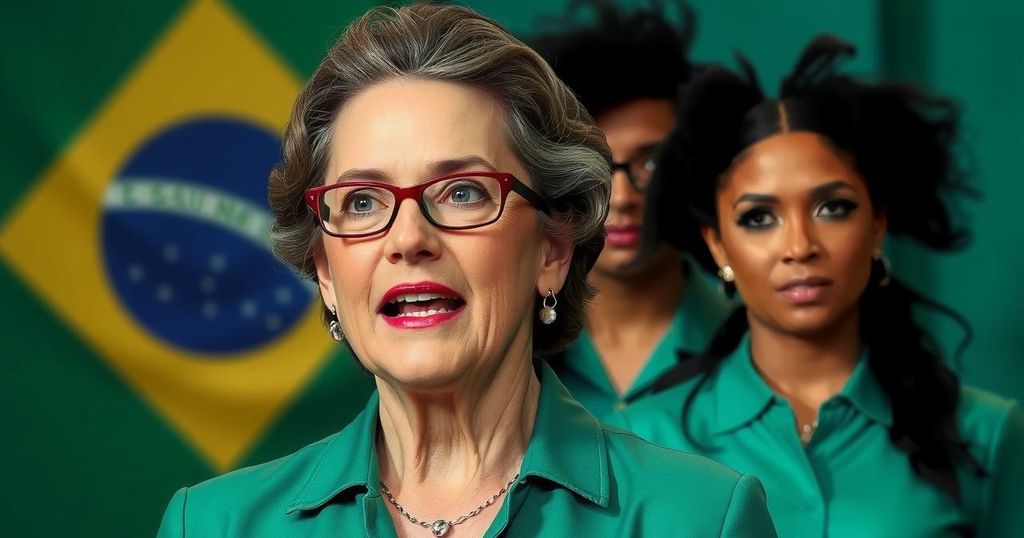Rising Violence Against Journalists in Brazil’s Municipal Elections

Amid Brazil’s municipal elections, female and minority journalists face an alarming increase in harassment and attacks. A report from the Coalition in Defense of Journalism reveals that despite constituting a minority in the media, women journalists are subjected to disproportionate violence, reflecting a culture of misogyny. Furthermore, Black journalists experience systemic racism, posing significant threats to journalistic integrity and freedom of expression in Brazil.
Brazil’s municipal elections have exposed a troubling trend of increasing hostility towards journalists, particularly women and minorities in the media. According to a report from the Coalition in Defense of Journalism (CDJor), initiated in August and concluding in late October, a significant number of attacks targeted female journalists, who remain a minority in this field. This uptick in violence reflects a broader culture of misogyny and discrimination that sustains systemic hostility towards both the media and protected groups in Brazil.
Analysts emphasize that the patriarchal nature of Brazilian society fuels this climate of aggression. Cristina Zahar, of the Committee to Protect Journalists (CPJ), highlights the societal challenges women face when entering public domains, underlying the need for systemic change in attitudes towards female journalists. The municipal elections marked a notable shift to the right, with numerous right and center-right candidates securing victories, despite the backdrop of increasing hostility towards journalists, particularly under the previous administration.
The CDJor report also reveals alarming racism faced by Black journalists, documented through instances of racial abuse directed towards them. Pedro Borges, a targeted Black journalist, illustrates the dehumanizing nature of the attacks, emphasizing how such hostility undermines the identities and professionalism of Black journalists in Brazil. Women journalists, notably, were frequent victims of social media harassment, encountering demeaning remarks regarding their appearance and capability.
Juliana Dal Piva, an investigative journalist, narrates her experiences of harassment and threats, particularly following her investigative work on the actions of former President Bolsonaro. Her situation represents a greater struggle for women journalists who endure escalated levels of online abuse, often riddled with misogynistic slurs and severe threats. The legacy of Bolsonaro’s administration has established an environment unwelcoming to investigative journalism, indicative of a dangerous trajectory for press freedom in Brazil.
Although Bolsonaro has exited political power, concerns about an entrenched culture of hostility against journalists linger. Zahar speaks to the challenges ahead, positing that the abnormality in press relations, initiated under Bolsonaro, poses ongoing threats to journalistic integrity. The CDJor also recommends implementing robust protective measures for journalists, emphasizing the necessity for accountability and improvements in online platform regulations to mitigate attacks.
The context of increased violence against journalists in Brazil coincides with the heightened political tensions during the recent municipal elections. With a majority of right or center-right candidates prevailing, the atmosphere has become more charged, creating a backdrop for hostility towards reporters, especially women and minority groups. Previous administrations have fostered a culture that emboldens aggressive retaliation against critical media, negatively impacting press freedom. This growing trend coincides with structural disparities in the representation of women and minorities in Brazilian journalism, exacerbating existing vulnerabilities within the field.
The troubling trend of violence against journalists in Brazil, particularly among women and minorities, calls for immediate attention to protect freedom of press. The incidents documented underscore an urgent need for systemic change to combat both misogyny and racism within the media landscape. Ensuring accountability and enhancing protective policies for journalists are critical steps towards fostering a more equitable and safe environment for all media professionals in Brazil. Only through addressing these societal issues can the prospects for a free and unfettered press be secured, safeguarding democratic values.
Original Source: www.voanews.com







